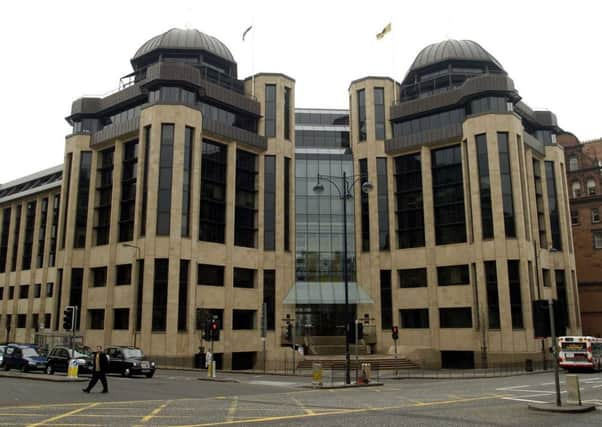Standard Life may retreat from independent Scotland


The pensions and savings firm has been a stalwart of Edinburgh’s financial services scene for almost 200 years. But uncertainty over the currency and EU membership after a Yes vote could force it to relocate some of its business south of the Border, its bosses said.
Royal Bank of Scotland also raised concerns yesterday over the uncertainty surrounding a Yes vote and warned it could damage its credit rating.
Advertisement
Hide AdAdvertisement
Hide AdFirst Minister Alex Salmond insisted the financial sector would find Scotland a “good place to do business” after independence and said Standard Life had voiced similar concerns over devolution, which proved to be unfounded.


He blamed a “conspiracy” on the part of the main opposition parties, after they vetoed the prospect of Scotland sharing the pound in the event of independence.
However, international credit agency Standard and Poor’s provided some cheer for the Yes campaign in a report that said Scotland’s wealth levels were comparable to AAA-listed nations. But it also warned an independent country would face “significant” challenges.
The SNP government is facing business pressure to provide “evidence-based clarity” of the landscape firms will face if Scotland votes to leave the UK. Similar concerns are expected from other big firms as the financial reporting season gets under way.
In its annual report, Standard Life revealed it had already begun to set up additional registered companies outside Scotland “into which we could transfer parts of our operations if it was necessary to do so”.
It said Scotland had been a good base for the firm, but added: “We will take whatever action we consider necessary – including transferring parts of our operations from Scotland – in order to ensure continuity and protect the interests of our stakeholders.”
This could see the firm move some of its 5,000 Scottish-based staff – out of a total workforce of 8,500 – and parts of its business from Scotland to England if there is a Yes vote in the referendum.
The company has yet to say which parts of its operations might be moved south.
Advertisement
Hide AdAdvertisement
Hide AdChief executive David Nish said action had been taken amid continued uncertainty ahead of the independence referendum, to be held on 18 September.
He said: “We have a longstanding policy of strict political neutrality, and at no time will we advise people on how they should vote. However, we have a duty and a responsibility to understand the implications of independence for our four million UK customers, our shareholders, our people and other stakeholders in our business, and take whatever action is necessary to protect their interests.”
He said there was still doubt over a “number of material issues”, including what currency an independent Scotland would use and what the arrangements would be for financial regulation.
“We will continue to seek clarity on these matters, but uncertainty is likely to remain,” he said. “In view of this, there are steps we will take based on our analysis of the risks.”
The Scottish Government wants to retain the pound in a monetary union after independence. This has been ruled out by the three main parties at Westminster, but the Scottish Government claims they will climb down after a Yes vote to minimise the impact on business.
Royal Bank of Scotland, which also reported its annual results yesterday, said it was “politically neutral’’ on independence, but warned a vote in favour may impact on the group. It said: “The group’s borrowing costs and its access to the debt capital markets and other sources of liquidity depend significantly on its and the UK government’s credit ratings, which would be likely to be negatively impacted by political events, such as an affirmative outcome of the referendum for the independence of Scotland.’’
The bank stressed it was “impossible” to quantify the financial hit of a Yes vote.
It said: “Clearly, there are issues we are looking at – currency, financial regulation, lender of last resort, credit ratings – which could affect us. But there is real uncertainty about how any of these matters would be settled in the event of a Yes vote and the outcome would depend on negotiations between the two governments.”
Advertisement
Hide AdAdvertisement
Hide AdFinancial services is at the heart of the economic case for independence. The sector, largely based in Edinburgh, is worth about £11.2 billion a year and employs some 200,000 people.
At First Minister’s Questions, Mr Salmond played down any concerns, as he came under attack from opposition parties, including Scottish Labour leader Johann Lamont.
He said: “Standard Life will find Scotland a good place to do business – as it indeed does business in ten countries around the world. Is it really the case Johann Lamont is making that Scotland is not going to be a good place to do business? Because the evidence tells us, and it is substantial evidence, that not only will it be a good place to do business, but an independent Scotland will be a more competitive place to do business.” Ms Lamont said it was “precisely because Scotland is a good place to do business we want Scotland to stay strong in the United Kingdom”.
Concerns over the potential impact of independence have already been raised by other firms, such as BP, Asda and Sainsbury.
John Cridland, of the CBI, said companies faced “uncertainties” over currency, the monetary system, EU, taxation and regulation. “Businesses need evidence-based clarity from the Scottish Government so future jobs and competitiveness can be assured,” he said.
ANALYSIS
Bill Jamieson: Simple case of a company looking after its customers
Standard Life may be a giant, impersonal business – but it is one very close to Scottish hearts. Any change in its management structure or operations arouses strong emotions, as the controversy over demutualisation proved some 14 years ago. Now its declaration that it may move operations outside Scotland in the event of independence has further raised the temperature of the political debate.
Will other Scottish-based financial institutions follow? That looks more than likely, and for one stark and obvious reason: if the companies don’t make a move to provide some reassurance, their clients will almost certainly walk. And that would be a huge blow, both for Standard Life and for Scotland’s fund management sector, critically dependent on attracting investment monies and mandates from across the UK and the world.
Advertisement
Hide AdAdvertisement
Hide AdAt the heart of the Standard Life public company is Standard Life Investments (SLI). Based in Edinburgh’s George Street, it is the inner citadel of the plc, the “state-within-the-state” handling investment monies and pension portfolios for institutions across the UK and the world. All told, out of Standard Life’s total “pot” of £240 billion assets under management, it manages £184bn of investments, up from £145bn over the past year.
Of this, £97.4bn comprises “third-party assets” – such as a local authority or public sector pension fund. Many local authorities let SLI manage all or part of their pension fund money – typically, SLI will get a portion of the money, called a partial portfolio mandate, managing, for example, the local authority’s equity portfolio or the fixed interest segment.
Last year, net sales of investment products totalled £10.1bn, against £6.1bn previously. This is a huge money-spinner for the company – and it critically depends on investor confidence and trust.
If an investor fears there may be some uncertainty over the currency in which Standard Life does business, or some additional regulatory cost or hurdle, this third-party business can easily be shifted to any one of SLI’s competitors – Legal & General, for example, or the Prudential. The business is lost to Scotland.
What SLI now feels compelled to do is to give its customers assurance they can have access to their funds anywhere they wish, in the currency they wish and managed in a regulatory regime with which they are familiar. Hence the announcement that it has started work to establish additional registered companies to operate outside Scotland, into which it could transfer parts of its business.
Worries over currency arrangements were the clincher after Chancellor George Osborne and senior spokespeople for Labour and the Lib Dems ruled out negotiations on a formal currency-sharing arrangement.
First Minister Alex Salmond may be confident he can call Westminster’s bluff. But there is no certainty he will be proved correct. And fund management companies may well feel it is not their business to share this gamble with him.